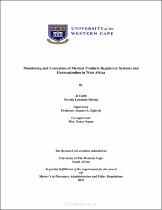| dc.contributor.advisor | Egieyeh, Samuel A | |
| dc.contributor.author | Hettige, Navoda Lakshani | |
| dc.date.accessioned | 2024-04-02T10:27:27Z | |
| dc.date.available | 2024-04-02T10:27:27Z | |
| dc.date.issued | 2023 | |
| dc.identifier.uri | http://hdl.handle.net/11394/10698 | |
| dc.description | Magister Pharmaceuticae - MPharm | en_US |
| dc.description.abstract | The Food & Drug Authority (FDA) defined regulatory harmonization as a process where regulatory agencies align technical guidelines for marketing and the development of pharmaceutical products all over the world. Regulatory harmonization can increase efficiencies in regulatory agencies worldwide and reduce duplication of efforts. The African Medicines Regulatory Harmonization (AMRH) initiative is recognized as the bedrock of medicine regulations in the African region. As the first step, the AMRH initiative established the East African Community Medicines Regulation Harmonization (EAC-MRH) program in 2012 in the East African Community (EAC). The Medicines Regulatory Harmonization project harmonized the different aspects and legal frameworks within that regional economic community and proposed a reliance model for medicine registration. As a result, there was increased access to quality medicines and the emergence of medicine manufacturers in Africa. In 2015, the AMRH initiative established the Economic Community of West African States Medicines Regulatory Harmonization (ECOWAS-MRH) program in Ghana to enhance medicine regulation in West Africa with the collaboration of the World Health Organization (WHO) and the New Partnership for Africa's Development (AUDA-NEPAD). The AMRH initiative conducts monitoring & evaluation studies to assess the performance of quality management systems (QMS), good manufacturing practices (GMP), information management systems (IMS), and registration systems in national medicines regulatory authorities of countries within a respective regional economic community. This study aimed to analyze the monitoring and evaluating data from the ongoing implementation of the Medicines Regulatory Authorities’ (MRAs) regulatory systems and harmonization program in the ECOWAS region by AUDA-NEPAD. The data were collected by administering a previously validated questionnaire to the heads of the departments in each National Medicines Regulatory Authority (NMRA) and Regional Economic Community (REC) Secretariat. The questionnaire was designed based on nine categories following the WHO Global Benchmarking Tool (GBT). All these nine categories were further divided into sixteen indicators for ease of understanding. This project used the data collected by AUDA-NEPAD as a secondary data source. The data collected were qualitative and quantitative; therefore, a mixed-method approach was used to analyze the data. | en_US |
| dc.language.iso | en | en_US |
| dc.publisher | University of the Western Cape | en_US |
| dc.subject | Regulatory authorities | en_US |
| dc.subject | African Medicines Regulatory Harmonization initiative | en_US |
| dc.subject | Medicines Regulatory Harmonization program | en_US |
| dc.subject | Food & Drug Authority (FDA) | en_US |
| dc.subject | ECOWAS region | en_US |
| dc.title | Monitoring and evaluation of medical products regulatory systems and harmonization in west Africa | en_US |
| dc.type | Thesis | en_US |
| dc.rights.holder | University of the Western Cape | en_US |

